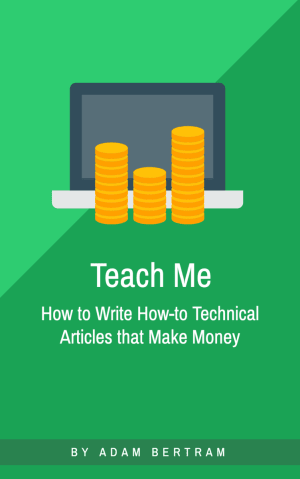[To be self-employed] requires self-compassion, curiosity, and adaptability. I don’t see how entrepreneurs can survive with rigidity.
Angie Robertson
I recently published a blog post about my experience being rejected for a position at Microsoft. During that blog post, I spoke about my experience with being rejected and my epiphany that made me realize full-time employment wasn’t for me.
I decided to interview the director at Microsoft who passed on me to get her thoughts on what she saw and her impressions on interviewing and self-employment.
Enjoy!
-Adam
Please tell me about yourself. Please give us your name, your current position, where you work, and a typical day. What are your current responsibilities?
My name is Angela Robertson. I work at Microsoft as a Group Program Manager in the Experiences + Devices group. I am accountable for the identity and security product experiences in Word, Excel, and PowerPoint. Depending on the scenario, I am also accountable for identity and security experiences in some other Microsoft 365 applications.
Based in Redmond, Washington, I usually work from an office on the Microsoft campus. I’m very grateful that, during the pandemic, I’ve been able to work from home. I look forward to going back to campus when it is safe to return.
One of my favorite things about my role is the variety of challenges. That might seem crazy, but I want to grow and learn. As a people manager, I talk with customers to:
- Provide clarity to the product team’s plans and delivery timelines
- Partner with Group Engineering Managers to ensure the team has clarity on priorities and I am aware of roadblocks that need to be removed
- Engage in weekly 1:1s with team members
- Facilitate team meetings
- Brief my peers on strategy and implementation plans
- Drive alignment on priorities across Microsoft
- Report on progress to plan via qualitative and quantitative measures
- Manage change to improve operational excellence
- Write briefs to explain strategy
- Interview
- Listen to feedback and ask a lot of questions
Where did you start in your career? Where has your career taken you over the years?
My career started as a contractor for Data General. I worked at Data General for three months before receiving an offer to join IBM as a full-time employee. I loved my experience at Data General – working with engineers to deliver software that other developers wanted to use was thrilling.
At IBM, I started my career in the engineering group for the Network Hardware Division. The division was soon sold to Cisco and I thought I would be looking for another job. Our leader pivoted the team’s mission to working with Global Services.
Whether it was network hardware or working with a customer on a Global Services engagement, I realized that my unique talent was listening to the technical problem that was presented, offering a strategy to meet customer needs, getting alignment on the strategy, and implementing the strategy.
As someone who is curious, the constant technology changes didn’t bother me. Each team had long-serving team members who had the depth of knowledge that complimented my beginner’s mind, and together we would deliver success on whatever problem we were asked to solve.
After several years, I joined the Software Group at IBM where I worked on network management, monitoring, identity, security, and storage software. Folks would pull me into assignments, I’d spend a couple of years, and then get routed to a new role where my problem-solving skills were needed.
I spent 17 years at IBM before resigning in 2015 to join Red Hat. I worked in the Customer Experience organization as a program manager and then manager of program managers. My time at Red Hat was shorter than expected as my husband accepted a job at Microsoft in 2016 and we moved to the Pacific Northwest.
In my last role with IBM, I was 100 percent remote. I had intentionally moved to Red Hat so I could go to work and collaborate with people in person. While my manager at Red Hat was supportive of me being a remote employee, I knew that I needed to have the camaraderie of coworkers in a shared workspace.
My time at Microsoft has been surreal. I had not used a Windows system for 10+ years before joining Microsoft and had spent more time working on clients.
The first 3.5 years at Microsoft I worked with more service-focused engineering teams. My team was responsible for developing, delivering, and maintaining the technical documentation that people relied on to use Azure, device and app management, developer tools, and more.
I loved leading a large team, ensuring we were ready for the large events like //build and Ignite, partnering with engineering when there was a problem and my team could help mitigate the customer impact, and more.
Over time, the budget and HR issues of leading a large team drained my energy. I missed having the opportunity to focus on a specific domain and working more directly with customers.
About a year ago, I moved from the Cloud + AI division at Microsoft to take on my current assignment in Experiences + Devices. This role feels like the other responsibilities I’ve had over the years make sense – we’re building a client library platform that will be widely deployed, influencing the data protection strategy, and helping people trust that they can use applications like Word, Excel, and PowerPoint in any environment.
What is your most favorite part of the interviewing process and why?
I love to listen to people talk about their experiences.
At the start of every interview, I inform the candidate that they’ll hear me ask behavioral interview questions. With the time we have to get to know each other, I want the candidate to frame their previous work experience and talk about the decisions that they made.
Resumes identify accomplishments. I want to leave the interview understanding the decisions and the decision-making approach a person leverages to deliver accomplishments.
What is the most memorable experience you’ve had during an interview?
There are times when I am asked to interview to recruit (aka sell) a candidate on choosing to work at Microsoft. One Friday afternoon, I was asked to interview a candidate who had been on campus interviewing all day and everyone wanted to hire this person. The team wanted me to make sure the person finished the day feeling positive about joining the company.
I invited her into my office and the first thing she said was, “Finally, a woman.” I smiled and asked if I was the first woman she had seen all day. Unfortunately, I was the first woman she had interviewed with and that was concerning her.
We talked candidly for an hour about representation, her life experiences, and how those experiences would be appreciated and celebrated. As she had experienced, representation matters and she could be part of the change.
She noted that the most senior person she had met that day was me, and while she was concerned that she had not met any women prior to seeing me, she loved that I was “in charge”.
That interview has stayed with me. I have always consistently required people with different backgrounds and experiences on the interview schedule. I do this so that candidates understand that the group that they’re joining is diverse in a variety of ways.
My commitment to improving representation is deeper since that person let me see the impact it had on their experience.
We know each other from my interview with you at Microsoft. I actually wrote a recent blog post about the experience because it really helped me. You were a huge help in making me realize a full-time job just wasn’t for me.
Looking back at our interview, what exactly did you see in me that made you believe I wouldn’t be a good fit for Microsoft as a full-time employee?
As you talked about your accomplishments, decision-making process, and the work that you love to do, I realized that the size of Microsoft would feel like a burden.
When I went from IBM to Red Hat, one of the adjustments that I had to make was moving from a very large organization to a mid-size company. That change required me to adjust more than I expected.
For example, at large companies, certain systems are in place that are optimized for large groups of people. There is a lack of personalization and flexibility that can either be jarring or comforting. As someone who grew up with a parent in the military, I find the structure of large organizations to be comforting. There are a lot of things I don’t have to think about because the organization has set practices to follow.
I have friends and family members who never want to work at a company the size of Microsoft because the structure is too confining. They don’t want to have to align strategy and implementation across n number of teams, align code deployments to a specific schedule that seems arbitrary, etc.
I love that different people need different things. When I observe someone might find Microsoft incompatible, I encourage that person to pass on the company because I trust that they’ll find work that is more suited to their strengths and preferences.
What advice can you give to someone that full-time employment may not be for them?
Trust that you will be successful if you honor your strengths and needs. When I feel the need to conform to some idea that seems incompatible, I watch documentaries to remind myself that different people take different paths.
What are some of the top skills someone needs to have to succeed at being an entrepreneur?
Resilience. While every person can benefit from cultivating resilience, entrepreneurs face challenges that require creativity and optimism. With creativity, the entrepreneur can adapt as needed. Optimism reminds us that struggles don’t last forever.
What kind of personality (if any) do you believe someone must possess to be successful at being their own boss?
I don’t know if there is any one personality that someone must possess. Self-compassion is important, as are curiosity and adaptability. I don’t see how entrepreneurs can survive with rigidity.
Describe the perfect interviewee that you’d hire right away.
Hmm… I don’t know if there is a perfect interviewee that I’d hire right away. Every person I interview is going to be great at some job. My role, as an interviewer, is to assess if the role I’m interviewing for matches what the candidate has to offer and wants to give.
Where can people find you to ask any follow-up questions or get in touch with you?
People can find me on LinkedIn at https://www.linkedin.com/in/arobertson98/ and Twitter at @ARobertson98. Thanks for the opportunity!

